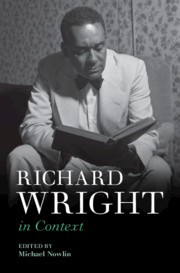Book contents
- Richard Wright in Context
- Richard Wright in Context
- Copyright page
- Contents
- Figures
- Contributors
- Abbreviations
- Richard Wright’s Works: A Chronology
- Introduction Richard Wright’s Luck
- Part I Life and Career, Times and Places
- Part II Social and Cultural Contexts
- Part III Literary and Intellectual Contexts
- Chapter 17 Chicago Sociology
- Chapter 18 1930s Proletarian Fiction
- Chapter 19 The Blues in Print
- Chapter 20 Realism and Modernism, Solipsism and Solidarity
- Chapter 21 The Literary Mainstream: Story and the Book-of-the-Month Club
- Chapter 22 Wright, Psychoanalysis, and Fredric Wertham’s Reading of Hamlet
- Chapter 23 Wright’s Black Boy in Context
- Chapter 24 Wright and Women Authors
- Chapter 25 Existentialism
- Chapter 26 Wright and Les Temps Modernes
- Chapter 27 Wright and Postcolonial Thought
- Chapter 28 Modern Poetry and Haiku
- Part IV Reputation and Critical Reception
- Index
Chapter 18 - 1930s Proletarian Fiction
from Part III - Literary and Intellectual Contexts
Published online by Cambridge University Press: 08 July 2021
- Richard Wright in Context
- Richard Wright in Context
- Copyright page
- Contents
- Figures
- Contributors
- Abbreviations
- Richard Wright’s Works: A Chronology
- Introduction Richard Wright’s Luck
- Part I Life and Career, Times and Places
- Part II Social and Cultural Contexts
- Part III Literary and Intellectual Contexts
- Chapter 17 Chicago Sociology
- Chapter 18 1930s Proletarian Fiction
- Chapter 19 The Blues in Print
- Chapter 20 Realism and Modernism, Solipsism and Solidarity
- Chapter 21 The Literary Mainstream: Story and the Book-of-the-Month Club
- Chapter 22 Wright, Psychoanalysis, and Fredric Wertham’s Reading of Hamlet
- Chapter 23 Wright’s Black Boy in Context
- Chapter 24 Wright and Women Authors
- Chapter 25 Existentialism
- Chapter 26 Wright and Les Temps Modernes
- Chapter 27 Wright and Postcolonial Thought
- Chapter 28 Modern Poetry and Haiku
- Part IV Reputation and Critical Reception
- Index
Summary
Wright’s literary career was encouraged by the Communist Party-sponsored John Reed Club and nurtured within the proletarian literary movement whose writers were committed to representing class inequality and warfare from the standpoint of the eventual triumph of the proletariat. Like many other proletarian writers, his fiction is, therefore, strongly influenced by the philosophy of dialectical materialism popular within the Communist movement. Wright’s fiction, notably Uncle Tom’s Children and Native Son, powerfully synthesizes a dialectical perspective with literary realist and naturalist representational techniques, although he also experimented with avant-garde literary techniques he associated with the likes of James Joyce and Gertrude Stein, as evident in Lawd Today! His fiction depicts the ways in which his mostly poor, working-class black characters suffer intensely from the class system of capitalism and the racism it engenders. It also depicts the inherent potentials within his characters’ lives to transcend ideologically and materially the inimical social system at the root of their suffering.
Keywords
- Type
- Chapter
- Information
- Richard Wright in Context , pp. 196 - 204Publisher: Cambridge University PressPrint publication year: 2021

